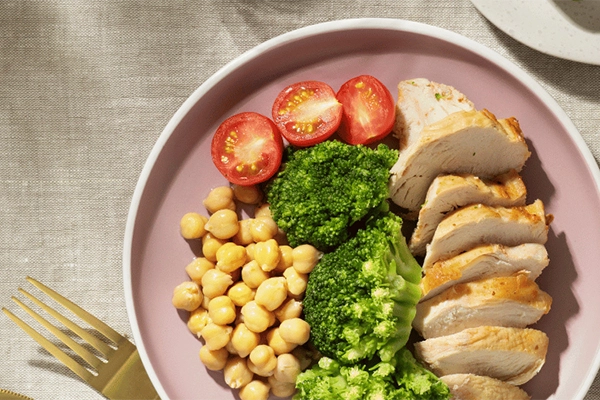What is IBS (Irritable Bowel Syndrome)?
Irritable Bowel Syndrome (IBS) is a long-term medical condition that impacts the functioning of the colon (large intestine). It is characterised by abdominal discomfort, altered bowel habits (constipation or diarrhoea), bloating, and gassiness.
The exact causes of IBS are unknown, but it is thought to result from a combination of factors including bacterial infections in your digestive tract, food intolerance, or stressful life events.
What are the symptoms of IBS?
Symptoms of IBS can differ greatly from one individual to another. They can go from being minor annoyances to seriously troubling. These involve:
- Abdominal pain or cramping
- Bloating
- Gas
- Diarrhoea
- Constipation
- Alternating bouts of diarrhoea and constipation
- Mucus in the stool
IBS symptoms can often be managed through a combination of dietary changes, lifestyle modifications, and medication.
What are the best diets for Irritable Bowel Syndrome?
When managing IBS, understanding the best diet is essential for finding relief from its often-debilitating symptoms.
Low FODMAP diet plan for IBS
One of the best diets for IBS is the Low FODMAP diet. FODMAPs (Fermentable Oligosaccharides, Disaccharides, Monosaccharides, Polyols) are types of carbohydrates (sugar) that can trigger IBS symptoms in some individuals.
Researchers have found that the small intestine poorly absorbs FODMAPs, which leads to an increase in fluid and gas in the bowel. This happens because FODMAPs are readily fermented by bacteria in the colon. The resulting rise in fluid and gas causes bloating and alters the digestive speed, leading to gas, pain, and diarrhoea. Reducing the intake of these carbohydrates can help alleviate these symptoms.
Low FODMAP foods, also known as low-carb diets, are:
- Dairy: Lactose-free milk, rice milk, almond milk, coconut milk, lactose-free yogurt, cheeses (feta, brie).
- Fruits: Bananas, blueberries, cantaloupe, grapefruit, honeydew, kiwi, lemon, lime, oranges, strawberries.
- Vegetables: Bamboo shoots, bean sprouts, bok choy, carrots, chives, cucumbers, eggplant, ginger, lettuce, olives, parsnips, potatoes, spring onions, turnips.
- Protein: Beef, pork, chicken, fish, eggs, tofu.
- Nuts / Seeds (limit to 10-15 each): Almonds, macadamia, peanuts, pine nuts, walnuts.
- Grains: Oats, oat bran, rice bran, gluten-free pasta (rice, corn, quinoa), white rice, corn flour, quinoa.
The Low FODMAP diet follows a simple 3-step plan:
- Start by avoiding specific foods (high FODMAP).
- Gradually reintroduce them to pinpoint any issues.
- Avoid or reduce those problematic foods while enjoying everything else.
Some high-protein foods are also high in FODMAPs that are known to trigger IBS and lead to constipation or diarrhoea, depending on individual tolerance. It is recommended to maintain a balanced protein intake and consult a dietitian to determine the best protein sources for your IBS management.
High fibre diet
Dietary fibre can improve constipation in IBS by softening and facilitating the passage of stool.
Fibre can be categorised into 2 types:
- Soluble fibre: Found in foods like beans, fruits, and oats.
- Insoluble fibre: Present in whole-grain products and vegetables (whole food plant-based diet).
Traditional IBS culture urban vs rural diet has proven this to be true, especially in Asian diets that typically boast higher fibre content than most Western dietary patterns. Consider adding fibre to your diet gradually, by 2 to 3 grams per day.
Gluten-free diet
The GFD (Gluten-Free Diet) is considered an exclusion diet of one or two specific foods. A gluten-free diet, which excludes wheat, barley, and rye, can benefit individuals with IBS who are gluten intolerant.
What are the foods to avoid for people with IBS?
Certain foods can exacerbate IBS symptoms and should be limited or avoided:
- Lactose: Cow’s milk, yogurt, pudding, ice cream, custard, cottage cheese, mascarpone, ricotta cheese.
- Fructose: Fruits (pears, apples, peaches, watermelon, cherries, mangoes), sweeteners (honey, agave nectar), products with high fructose corn syrup.
- Fructans: Vegetables (asparagus, artichokes, broccoli, Brussels sprouts, beetroot, garlic, onions), grains (wheat, rye), added fibre (inulin).
- GOS (Galacto-oligosaccharides): Legumes (lentils, chickpeas, kidney beans, soy products), vegetables like broccoli.
- Polyols: Fruits (apples, blackberries, apricots, cherries, pears, nectarines, peaches, plums, watermelon), vegetables (cauliflower, mushrooms, snow peas), sweeteners (sorbitol, mannitol, xylitol, maltitol, isomalt found in sugar-free gum, mints, cough medicines, and drops).
Trigger foods can vary from person to person. Keeping a food diary to track symptoms after meals can help identify personal triggers.
What are other ways to manage or relieve IBS?
There is no “fast” way to manage IBS, as it is a chronic condition. However, symptom management and relief are possible through dietary changes, lifestyle adjustments, and, in some cases, medication. The key is to work with a healthcare professional to create a tailored plan for your specific IBS symptoms.
- Regular exercise: Physical activity can improve digestion and reduce stress, which can benefit IBS patients.
- Stress management: Stress can exacerbate IBS symptoms. Some techniques, like deep breathing exercises, can help reduce stress and its impact on IBS.
- Adequate hydration: Drinking enough water is essential to prevent dehydration and maintain proper digestive function.
- Smaller, frequent meals: Eating smaller meals more often can help prevent overloading the digestive system, potentially reducing discomfort.
- Probiotics: Probiotics are live bacteria and yeasts that are good for your digestive system. Some studies have suggested that specific probiotics may help alleviate IBS symptoms, particularly diarrhoea-predominant IBS. However, their effectiveness varies from person to person. Do consult with a doctor to find the right probiotic for your condition.
Make an appointment at Pantai Hospitals
Consult our doctors if you are experiencing symptoms of IBS. A dedicated and expert team of Gastroenterologists at Pantai Hospitals is available for consultation to provide the best care and assistance.
Get in touch with us to book an appointment today if you have concerns or questions regarding IBS. We assure you the best possible care tailored to your specific needs.
Pantai Hospitals have been accredited by the Malaysian Society for Quality in Health (MSQH) for its commitment to patient safety and service quality.











.webp?sfvrsn=9f42ecac_9)
.webp?sfvrsn=2984d0c3_9)



